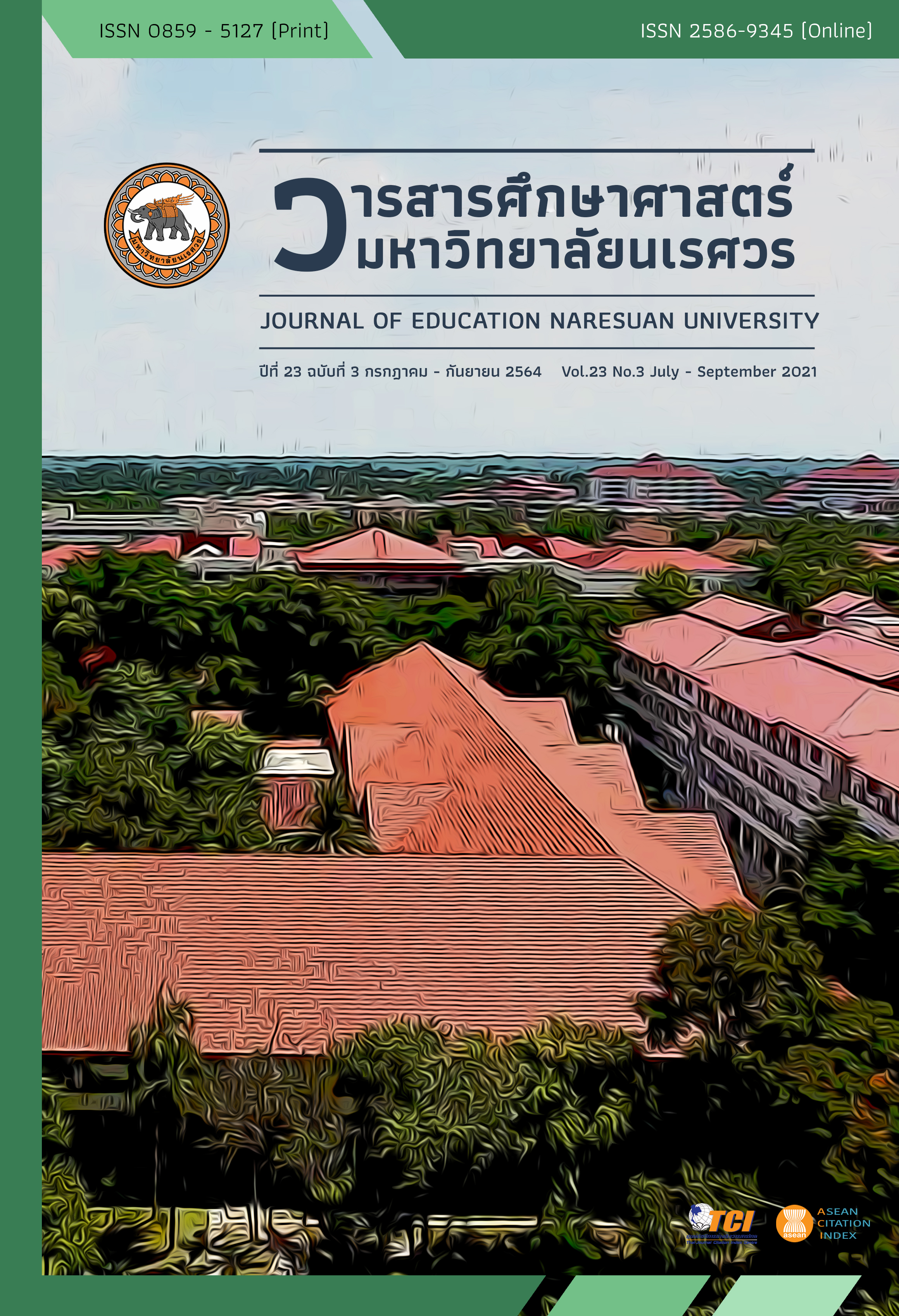TEACHERS’ TRAINING OF ENGLISH PRONUNCIATION SKILL THROUGH SOCIAL MEDIA
Main Article Content
Abstract
Teachers are role models to their students; thus, teachers with unintelligible English pronunciation can lead to failure in English education. Therefore, training English speaking with infectious pronunciation to teachers is inevitable. In addition, LINE is one of the most popular applications among Thai social media users. Because of its functions that support video clips, training of English pronunciation skill via LINE to lower-secondary school teachers in Thailand was studied. Research tools included a pronunciation pretest/posttest and training materials such as an IPA chart, audio files, video files, pronunciation practices and games, suggested websites, as well as online tools for pronunciation teaching and practices. A combination of coaching and Feedback Training method was used with Thai teachers of English who registered online to join the training program. The results showed that the overall pronunciation skill of the participants greatly improved as the posttest scores are significantly higher than the pretest scores (t=3.554, p<0.01). Additionally, the results also showed significant development in pronunciation of consonants (t=9.697, p<0.001) and intonation (t=2.557, p<0.05). Besides, the participants’ written reflections indicated the benefits of this training.
Article Details
The owner of the article does not copy or violate any of its copyright. If any copyright infringement occurs or prosecution, in any case, the Editorial Board is not involved in all the rights to the owner of the article to be performed.
References
Akter, Z. (2007). Teaching pronunciation: Does it matter? MET, 16(3), 36-38.
Baker, L. L. (2016). Re-conceptualizing EFL professional development: Enhancing communicative language pedagogy for Thai teachers. TEFLIN Journal, 27(1), 23-45.
Başöz, T. (2016). Pre-service EFL teachers attitudes towards language learning through social media. Procedia - Social and Behavioral Sciences, 232, 430-438. doi: 10.1016/j.sbspro.2016.10.059
Belardo, J. M., & Thienpermpool, P. (2018). Teachers’ readiness to promote learner autonomy in government universities in the northeast of Thailand. Journal of MCU Buddhapanya Review, 3(3), 267-280.
Bermudez, C. M., Prasad, P. W. C., Alsadoon, A., & Hourany, L. (2016). Students perception on the use of social media to learn English within secondary education in developing countries. 2016 IEEE Global Engineering Education Conference (EDUCON), Global Engineering Education Conference (EDUCON), 2016 IEEE (pp. 968-973). https://doi.org/10.1109/EDUCON.2016.7474668
Best, B. (2014). A study of elementary school Thai English teachers' perceived English proficiency and self-reported English teaching efficacy. Language in India, 14(7), 77-195.
Blume, R. (1971). Humanizing teacher education. PHI Delta Kappan, 53, 411–415.
Cabrera, R. L. (2016). English speaking and pronunciation competence in students of Suan Sunantha Rajabhat University. ICMSIT 2016: International Conference on Management Science, Innovation, and Technology 2016. Retrieved from http://icmsit.ssru.ac.th/icmsit/fmsicmsit1/images/2016/icmsit2016-1.pdf
Chakma, S. (2014). Difficulty in pronunciation of certain English consonant sounds. Sripatum Chonburi Journal, 10(3), 110-118.
Deerajviset, P., & Harbon, L. (2014). E-learning in EFL education in Thailand’ s higher education: The role for lecturers making it work. University of Sydney Papers in TESOL, 9, 37-63.
Ekahitanond, V. (2018). The impact of feedback in Facebook on students' language proficiency. TEM Journal, 7, 686-692. doi: 10.18421/TEM73-28
Franz, J., & Teo, A. (2018). ‘A2 is normal’ – Thai secondary school English teachers’ encounters with the CEFR. RELC Journal, 49(3), 322-338.
Fraser, H. (2000). Coordinating improvements in pronunciation teaching for adult learners of English as a second language. Canberra: DETYA.
Glomo-Narzoles, D. T. (2013). Classroom communication climate and communicative linguistic competence of EFL learners. Theory and Practice in Language Studies, 3(3), 404-410.
Khamprated, N. (2012). The problems with the English listening and speaking of students studying at a private vocational school in Bangkok, Thailand. Retrieved from http://thesis.swu.ac.th/swuthesis/Tea_Eng_For_Lan(M.A.)/Nualsri_K.pdf
Lundquist, L. (2012). Learning spoken English. Retrieved from https://www.pdfdrive.com/learning-spoken-english-e1493501.html
Lunenberg, M., Korthagen, F., & Swennen, A. (2007). The teacher educator as a role model. Teaching and Teacher Education, 23, 586-601.
Mannel, C., Schaadt, G., Illner, F.K., Meer, E., & Friederici. (2017). Phonological abilities in literacy-impaired children: Brain potentials reveal deficient phoneme discrimination, but intact prosodic processing. Developmental Cognitive Neuroscience, 23, 14-15.
Martin, J. T. (2019). English speaking anxiety of physical education major students. Asian EFL Journal, 23(3.2), 105-112.
Phothongsunan, S. (2019). The wider social context of school and Thai EFL university learners. Arab World English Journal, 10(2), 29-39.
Poolsawad, K., Kanjanawasee, S., & Wudthayagorn, J. (2015). Development of an English communicative competence diagnostic approach. Procedia - Social and Behavioral Sciences, 191, 759-763.
Sahatsathatsana, S. (2017). Pronunciation problems of Thai students learning English phonetics: A case study at Kalasin University. Journal of Education, Mahasarakham University, 11(4), 67-84.
Said, M. M., & Weda, S. (2018). English language anxiety and its impacts on students’ oral communication among Indonesian students: A case study at Tadulako University and Universitas Negeri Makassar. TESOL International Journal, 13(3), 21-30.
Soongpankhao, W. (2016). An exploratory qualitative study on English language instruction in a Thai university. Journal of Educational & Instructional Studies in the World, 6(1), 1-12.
Tayjasanant, C., & Suraratdecha, S. (2016). Thai EFL teachers and learners’ beliefs and readiness for autonomous learning. 3L: Language, Linguistics, Literature, 22(3), 153–169.
Wadsorn, N., & Panichkul, S. (2014). ‘River’ or ‘liver’? Exploring the intelligibility of Thai’s (mis)pronunciation of English ‘r’ and ‘l’. Language Education and Acquisition Research Network (LEARN) Journal, 7(2), 51-67.
Weawong, N., & Singhasiri, W. (2009). Native English speaking teachers’ beliefs about difficulties in teaching English to Thai learners. Retrieved from http://search.ebscohost.com/login.aspx?direct=true&db=ir01309a&AN=thaijo.article.114246&site=eds-live
Xodabande, I. (2017). The effectiveness of social media network telegram in teaching English language pro-nunciation to Iranian EFL learners. Cogent Education, 4(1), 1347081. doi:https://doi.org/10.1080/2331186X.2017.1347081


